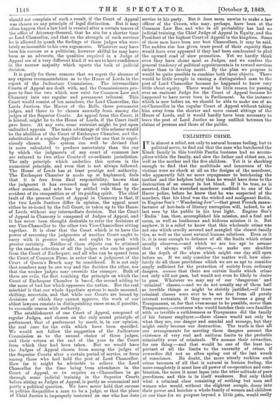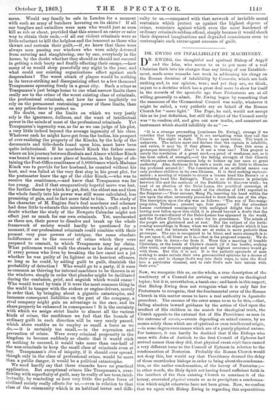UNLIMITED CRIME.
IT is almost a relief, not only to natural human feeling, but to political nerve, to find out that the man who butchered the Kinck family in this terrible Pantin business had no accom- plices within the family, and slew the father and eldest son, as well as the mother and the five children. Yet it is shocking enough to find that the multitude and innocence of the victims were no check at all on the designs of the murderer, who apparently felt no more repugnance to butchering the mother and the helpless baby than he would have done to the destruction of an enemy in hot blood. If it be true, as is asserted, that the wretched murderer confided to one of the Havre police, before he knew that he was suspected of the murders, that his ideal was the wicked and malignant Rodin, in Eugene Sue's "Wandering Jew"—that great French manu- facturer of hot-beds of literary corruption will, indeed, be at last seen by the public in his true light. Eugene Sue's 'Rodin' has, then, accomplished his mission, and a foul and mean, as well as loathsome and hideous mission it is. But anyhow, it is a relief to know that this wholesale crime was not one which cruelly severed and mangled the closest family ties, as well as the most natural human relations. Even as it is, it is near enough to defiance of all the limits which crime usually observes,—and which we are too apt to assume that it always will observe,—to make one shudder at the depth of the abyss which might one day still open before us. If we only consider the matter well, how abso- lutely do all those provisions which we are so apt to consider amply sufficient for the protection of society from ordinary dangers, assume that there are certain limits which crime not only will not pass, but would not even be likely to desire to pass. Whatever we may say of our 'dangerous' and 'criminal' classes,—and we do not usually say of them half as terrible things as might be strictly justified,—if those criminal classes were ever to be set free from all purely internal restraints, if they were ever to become a gang of Traupmanns, or, for that even seems to be possible, worse than Traupmanns,—creatures who would butcher their own families with as terrible a ruthlessness as Traupmann did the family of his former employer,—these classes would not only be what they are, our danger and scandal and scourge, but they might easily become our destruction. The truth is that all our arrangements for meeting these dangers assume the existence of very real and uniform limits to the probable criminality even of criminals. We assume their cowardice, for one thing,—and that would be one of the least im- portant of all the limits to the enormity of crime, if cowardice did not so often spring out of the last wreck of conscience. No doubt, the more utterly reckless such crime becomes of all that is natural in human feeling, the more completely it must lose all power of co-operation and com- bination, the more it must lapse into the utter solitude of pure greediness, and this is in itself weakness. But only think what a criminal class consisting of nothing but men and women who would, without the slightest scruple, decoy into their power and butcher a whole family of women and children at one time for no purpose beyond a little gain, would really
mean. Would any family be safe in London for a moment with such an army of butchers hovering on its skirts? If all our burglars and swindlers were men who would just as soon kill as rob or cheat, provided that this seemed an easier or safer way to obtain their ends,—if all our violent criminals were as little reluctant to kill the helpless and the innocent as those who thwart and restrain their guilt,—if ,we knew that there were always men passing our windows who were solely deterred from entering and slaughtering, one by one, everybody in the house, by the doubt whether they should or should not succeed in getting a rich booty and finally effecting their escape,—how many of us would sleep peacefully any night in the year, and what could our existing organizations effect against such desperadoes ? The worst attack of plague would be nothing in its terror-striking and disorganizing effect to a few thousand Traupmanns operating freely in a great city. Such a crime as Traupmann's just brings home to one what narrow limits there really are to the crime of the worst existing class of criminals, the professional criminals, and how far more implicitly we rely on the permanent restraining power of these limits, than on any police-force to protect us.
No doubt, one of the limits on which we very justly rely is the ignorance, dullness, and the want of intellectual power in the minds of most of the professional criminals. Yet Traupmann's ingenuity was, as far as we can judge of his plot, a very little indeed beyond the average ingenuity of his class. Whatever cash he might have got from the bodies, his prospect of ever realizing the property of the Kincks, by the help of the documents and title-deeds found upon him, must have been quite infinitesimal. If he murdered Kinck the father some- where on his journey between Roubaix and Alsace whither Kinck was bound to secure a new place of business, in the hope of ob- taining the Post-Office remittance of 5,000 francs which Madame Kinck was to provide for her husband, he counted without his host, and was foiled at the very first step in his great plot, for the postmaster knew the age of the elder Kinck,—who was to receive the remittance,—and knew that Traupmann was far too young. And if that comparatively hopeful move was lost, the further finesse by which he got, first, the eldest son and then the whole family into his power was still worse calculated, less promising of gain, and in fact more fatal to him. The study of the character of M. Eugene Sue's foul murderer and schemer had done little to educate this miserable wretch's craft ; and we doubt whether the study of the Newgate Calendar might not effect just as much for our own criminals. Yet, uneducated as these are, their power to dissolve and break up the whole framework of society would hardly be questioned for a moment, if our professional criminals could combine with their present very poor powers of intrigue, the same absolute indifference as to the amount of crime which they were prepared to commit, to which Traupmann may lay claim. What policeman would walk the streets as he does at present, if every person who lives by breaking the law cared not a jot whether he was guilty of its lightest or its heaviest offences, so long as he could, by adding guilt to guilt, diminish the probability of detection? Who would go to a party, if it were as common as thieving for infernal machines to be thrown in at the windows, simply in order that plunder might be facilitated during the confusion, grief, and anguish which would ensue ? Who would travel by train if it were the most common thing in the world to tamper with the stokers or engine-drivers, merely in order that, by bringing about a gigantic catastrophe, and immense consequent liabilities on the part of the company, a rival company might gain an advantage in the race, and its share property be enhanced in consequence ? It is the certainty with which we assign strict limits to almost all the various kinds of crime, the confidence we feel that the bounds of ordinary guilt in each direction will be very rarely passed, which alone enables us to employ so small a force as we do,— it is certainly too small,— in the repression and prevention of crime. Were every criminal propensity in the kingdom to become suddenly so elastic that it would stick at nothing to succeed, it would take more than one-half of the non-criminals to keep the small class of criminals even at bay. Traupmann's élan of iniquity, if it should ever spread, though only in the class of professional crime, would be more than a public danger, it would be a political catastrophe. We need hardly say that these remarks have no practical application. But exceptional crimes like Traupmann's, over- flowing with superfluity of guilt, may be really of use tons, intel- lectually, by reminding us how very little the police force of civilized society really effects for us,—even in relation to that class of the community which is an habitual terror and diffi- culty to us,—compared with that network of invisible moral restraints which protect us against the highest degrees of crime, restraints against which even the most hardened of ordinary criminals seldom offend, simply because it would shock their depraved imaginations and degraded consciences even to contemplate such extravagant excesses of guilt.































 Previous page
Previous page